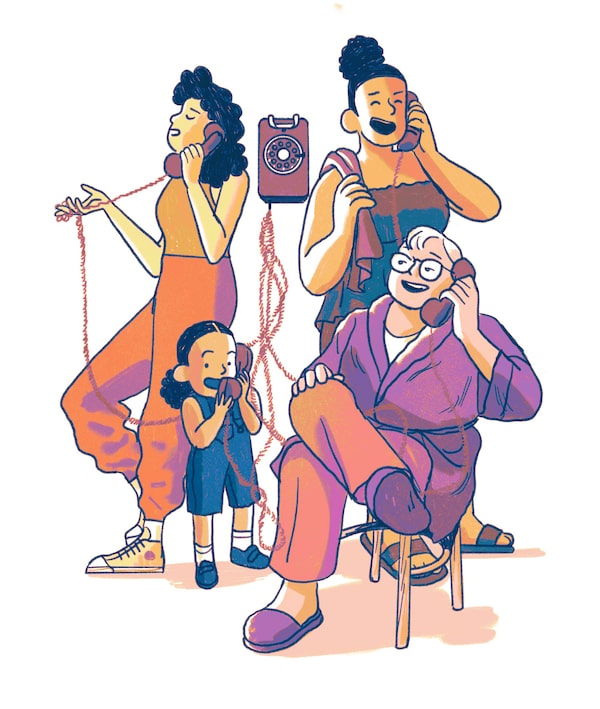First Person is a daily personal piece submitted by readers. Have a story to tell? See our guidelines at tgam.ca/essayguide.

Illustration by Drew Shannon
My mother’s phone does strange things. Beeps when it shouldn’t. Rings in the middle of the night and by the time my mother stumbles to it in the dark and picks up the receiver, there’s no one there. Nothing. Dead air. Then there are other times when I call her, where she sounds like she’s somehow speaking to me from some deep faraway underwater universe. The last time we were talking about this, my mother and I looked at each other and said “it never used to happen with the old phone.”
“Exactly,” my mother said. “I should go get the old phone.”
“You mean the rotary phone? The black one? You still have that?”
“Oh yeah, I have it.”
Of course she does. Somewhere in the “out with the old and in with the new,” the out turned out to be “out in the garage” not actually “out for good.”
We had two of them. One was at the bar downstairs and the other was near the kitchen table upstairs.
When the phone rang, you ran to answer it. You wanted to answer it. Someone somewhere thought of you, they needed you, they wanted you. They took the time to look up your number, put that rotary wheel through its paces, sit down and talk to you. Only you. And when you picked up that phone, you did the same. It was a thing, a destination, a state of being. Both of you entered into the same solemn tacit understanding. For the next little while – while long or short – you gave yourself over to the person on the other end of that line. I know I did. How else was I to go over every detail of my high-school existence or tell my friend I was going to drag my 10-speed out of the shed and bike over to watch a movie on VHS?
I remember doodling on the notepad beside the phone. I’d roll the phone coil between my fingers as I talked. Now and then, I’d be inspired to try to untangle the mess, only to find there was no removing the crimp of years of coil, and yet, I would persist.
Sometimes, my eyes would dance as my brain drew the story a friend was telling. Sometimes, I’d sneak a peek at what the neighbours were doing next door through the sheer curtains.
These were my distractions.
I wasn’t going anywhere or doing anything because I was already somewhere and doing something. Something important. I was listening. I was absorbing. I was connecting. Someone was telling me the story of their life in that moment and so they became part of my story in that moment. I was saying yes to this conversation and saying no to everything else. There was no clanging of dishes emptying the dishwasher, no interruption of your train of thought because someone was putting in their Starbucks order, no sound of traffic or sirens or whatever happens nearby while you are talking and walking the dog. There was no texting at the same time, no swiping, no scrolling, no doing anything other than talking on the phone.
I was doing something important. I was living my story. Someone else was listening. It mattered.
When landline was the only line, long-distance charges used to kick in at the city limits, more or less. My mother would often say you paid by the word so pick a few and say them fast. My parents used to get up at four in the morning to call relatives back home, not only to accommodate for the time change and to make sure everyone was home from the fields or the beach or church, but to get the lowest rate. My memories of those conversations are a bit nebulous, hazy as though hearing words in a dream. They were warm and loving and filled with a melancholy so deep of missing your family that no amount of time together could ever make up. How do you reconcile knowing that leaving your country and your family was probably the right thing to do but resenting you ever had to make the choice? In lives lived oceans apart, how do you capture the beauty of the mundane, the nuance of the ordinary, the very threads that weave our lives? But they tried and in those few moments, there was nothing else and no one else more important. Lifting that receiver was opening a portal where hearts were mended, where voices were a balm. When the call was over, tears trickled down the faces of both ends of the divide, knowing it would be a week or two until they could hear each other again, parents worried about children and children worried about parents.
That black rotary phone was their only way to be together.
Now we take for granted that we can talk to anyone anywhere as long as there is a cell signal. Yet we forget that making that call is about connection. It’s about human hearts thirsting for their lifeblood.
So if you are planning to call someone to talk, yell, vent, cry, celebrate or whatever, then call them. But show them that talking to them is more valuable than shuffling the papers on your desk or checking your calendar or eating that bag of chips.
Commit. Tether yourself to that person for five minutes or 10 or 60. Give yourself over to them. Fill their heart. Let them fill yours. We’re all we’ve got.
Beatrice Politi lives in Toronto.
Sign up for the weekly Parenting & Relationships newsletter for news and advice to help you be a better parent, partner, friend, family member or colleague.